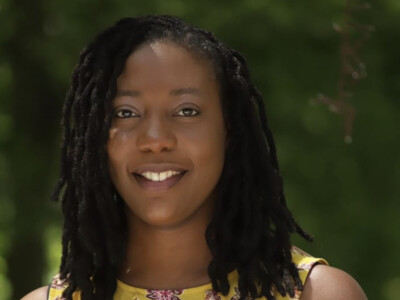To Dr. Fiona Conway, assistant professor and researcher at the Steve Hicks School of Social Work, the two roles of being a social work educator and a researcher have different yet connected things to love. “Social work for me is about providing services and support to people who are in vulnerable situations because of their membership in a particular group—like women who are dealing with breast cancer or people who use drugs.”
On research, Dr. Conway says, “What I love about being a researcher is that we are able to quickly respond to changing situations.” To Dr. Conway, research requires foresight, close attention, and the ability to see through a lens of what is important, all qualities she certainly possesses.
To illustrate this, Dr. Conway relays a recent story about an unexpected but vital study. Dr. Conway got involved with Project CONNECT during the second year of the program, when much of the infrastructure was already put in place. When COVID-19 hit, Dr. Kasey Claborn, the principal investigator, decided to pivot the project and study the impact of COVID-19 of those who use drugs. “We were able in a global health crisis to say, ‘Hey, this is going to be important, these are some people who we should be paying attention to.’ And we were able to do put together a study really quickly. That’s the fun part about being a social work researcher.”
“As expected, people who use drugs experience a lot of mental health strain due to financial challenges and social isolation from friends and family,” Dr. Conway describes. “One of the things that we didn’t necessarily see coming but that we learned from our interviews with participants is that there were a lot of changes in the drug market.” Dealers were having a hard time getting drugs across the border due to COVID-19 restrictions. Meanwhile, local suppliers stopped visiting their regular rotations because of fear of exposure to the virus. Both of these things resulted in an increase in drug prices.
Most troubling was the increase of overdoses reported to the researching team. Before the pandemic, people tended to use drugs in groups, but due to the rapid spread of the virus, drugs were being used more in isolation. There was now no one to intervene in the event of an overdose. Furthermore, organizations that provided harm reduction services had to reduce their contact with people. Fewer overdose-reversal drugs were available, and the organizations were faced by their own inability to distribute these life-saving doses. Their operations were hugely impacted, and some even had to close their doors for good.
While the manuscripts of this study are still forthcoming, Dr. Conway can clearly articulate the conclusions of the research: “We need to put more systems in place when we think about global health disasters to protect the most vulnerable. People who use drugs are vulnerable.” This new information needs to be implemented to “ensure continuity of service for [people who use drugs].”
Dr. Conway’s interest in addictions research began when she was a PhD student at Rutgers University. Her advisor was a specialist in substance use research, and Dr. Conway wrote her dissertation on the relationship between aggression and alcohol use in athletes. The seed that was planted in her PhD program has blossomed into an exploration of more specialized populations. Her current work seeks to help those with opioid use disorders manage their stress, anxiety, and cravings with the ultimate goal of relapse reduction and prevention.
Dr. Conway also loves working with students, BSW, MSW, and PhD students alike. She enjoys being a mentor to them as she teaches how to take research skills learned in the classroom and applying them in actual practice. On her dual roles as professor and researcher, she says, “I am really equally dedicated to being a researcher and being an educator. They inform each other.”


